18 Mar 2015 | Awards, Fellowship 2015
[vc_row][vc_column][vc_column_text] The 2015 Freedom of Expression Arts Award-winner is rapper Mouad “El Haqed” Belghouat, has not only seen his songs censored and his album banned but has also been imprisoned in his homeland Morocco three times since 2011.
The 2015 Freedom of Expression Arts Award-winner is rapper Mouad “El Haqed” Belghouat, has not only seen his songs censored and his album banned but has also been imprisoned in his homeland Morocco three times since 2011.
Belghouat’s music publicises widespread poverty and rails against endemic government corruption in Morocco, where he is banned from performing publicly.
“The Index award has shown Moroccan authorities that you can’t stop me. The more of an effort they make to silence me, the more my voice arrives everywhere.” — El Haqed[/vc_column_text][/vc_column][/vc_row][vc_row][vc_column][vc_basic_grid post_type=”post” max_items=”9″ style=”load-more” items_per_page=”4″ element_width=”6″ grid_id=”vc_gid:1501490616573-99369725-7b88-5″ taxonomies=”6986″][/vc_column][/vc_row]
16 Mar 2015 | Azerbaijan, Azerbaijan News, Europe and Central Asia, mobile, News and features
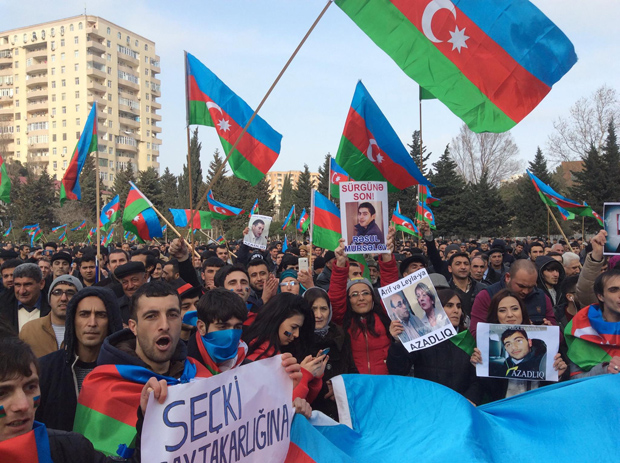
“Stop the plunder! Thieves in power, go! Resign!”
These were just some of the chants from the scores of Azerbaijanis who gathered in Baku’s Mashul stadium on Sunday. The estimated 10,000 strong crowd was protesting the recent devaluation of the country’s currency and its detrimental effects on living standards. Demonstrators also spoke out against human rights abuses in the country, just 87 days before its capital is set to host the inaugural European Games.
In late February, Azerbaijan’s central bank made the choice to devalue the manat around 30% against the dollar and the euro, in response to the recent drop in oil prices. Around 70% of government revenues come from oil exports. But the policy has led to significant price hikes, igniting the public anger which culminated in Sunday’s protest.
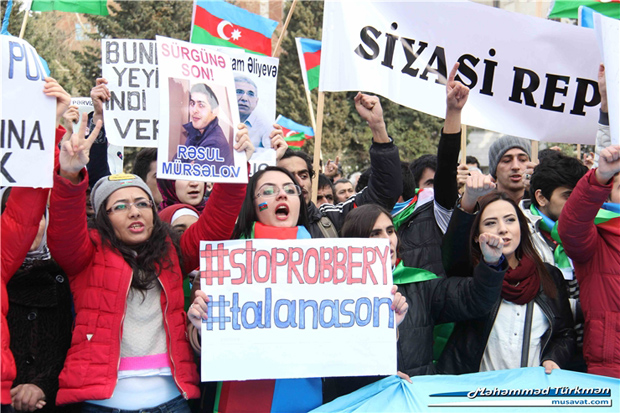
“Ranging from consumer goods, real estate, construction materials, equipment, automotive spare parts, everything is so much more expensive,” stated the official Facebook event, which attracted over 2,400 attendees. The organisers — the oppositional National Council of Democratic Forces (NCDF) — however, put attendance on the day at some 10,000.
The peaceful rally was authorised by the the regime of Ilham Aliyev, who has been in power since succeeding his father Heydar in 2003. In 2013 he won the presidency for a third time, following his 2009 decision to remove term limits, and amid accusations that the vote was not free and fair.
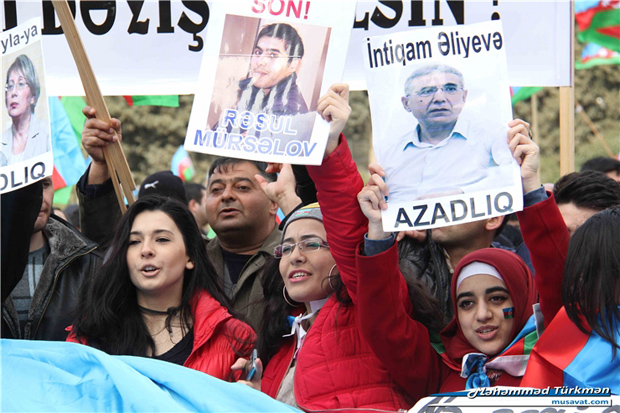
It took place against the backdrop of the countdown to this summer’s International Olympic Committee (IOC)-backed Baku European Games. This fact was not overlooked by protesters. Ali Kerimli, from opposition party Azerbaijan Popular Front, criticised the amount of money spent on the event, saying it could instead be “directed to address the serious social and economic problems, raising the minimum wage and pension, which is only 150 manat,” according to contact.az.
The games have been budgeted at over £5.4 billion, with Simon Clegg, the organising committee CEO (formerly of the British Olympic Association), promising it will be “the most fantastic show ever staged in Azerbaijan”.
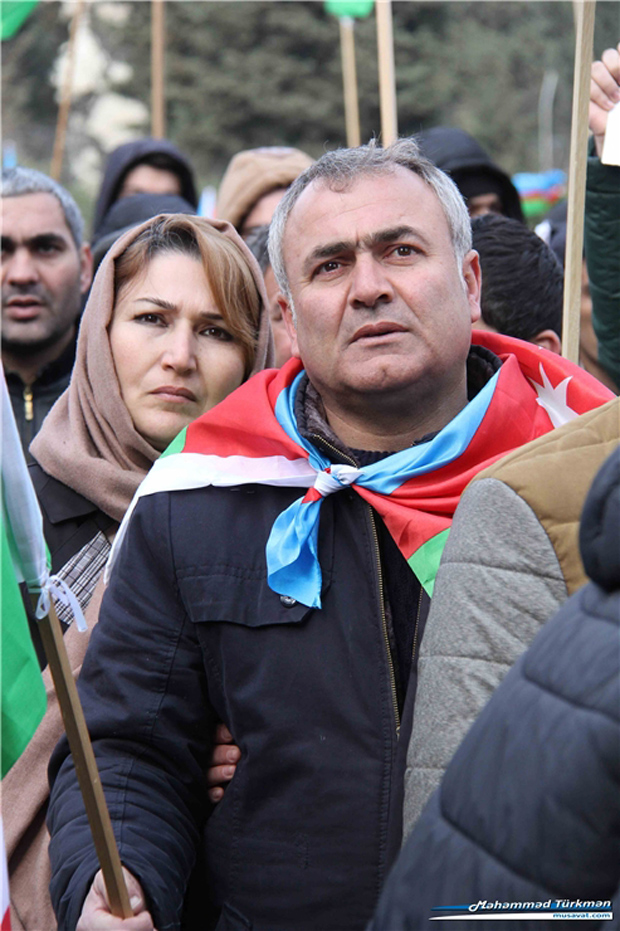
Kerimli also brought up the recent revelation that Azerbaijan will cover the costs of all 50 participating delegations. Such grants, most often connected to travel, have played an increasing part in Olympic bidding processes since they were first used at Sydney 2000. Today, “you cannot win without it”, according to the organising committee chair of this summer’s Pan American Games in Toronto. But as it is understood Azerbaijan was the only country willing to take on the risk of hosting the first ever European Games, it was not competing with anyone. Index contacted the European Olympic Committee (EOC) for documents related to the games, such a bid book detailing a city’s hosting plans, including the budget. We were told that as there is no formalised bidding procedure for the European Games, the only such documents that exists is the host city contract. This, we were told, is private and not available to the public.
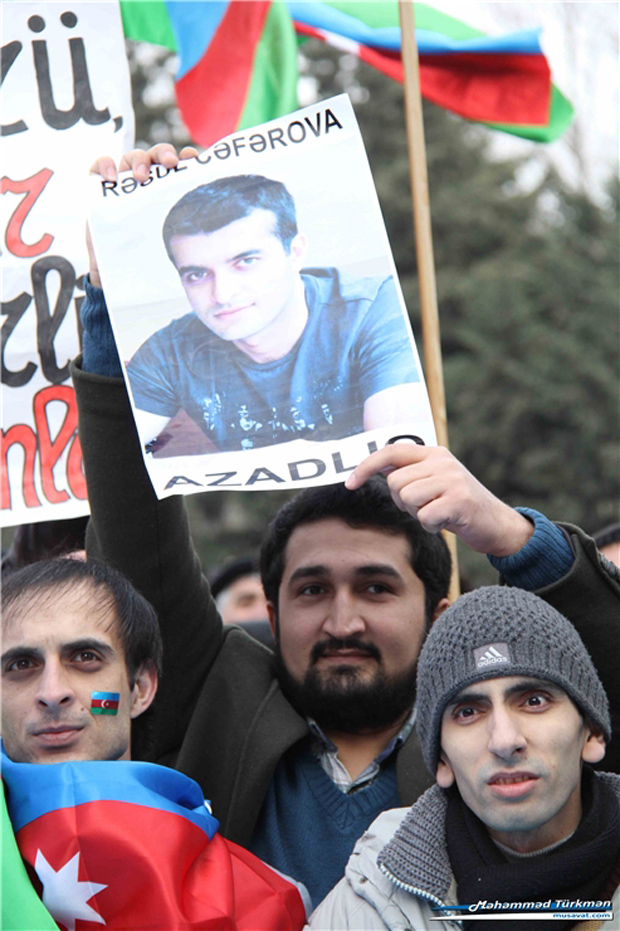
Azerbaijani authorities have been fighting a PR battle on multiple fronts for some time, paying for everything from beautifying Baku, to glossy magazines and international mega-events like the Eurovision Song Contest — with sports playing an increasingly important role.
The most famous example to date is the shirt sponsorship deal with reigning Spanish champions Atletico Madrid. Fernando Torres and his teammates recently started doubling up as miniature Baku 2015 advertising billboards. If nothing else, this will help football fans familiarise themselves with the name by 2020, when the capital will host three group games and one quarter-final of the European Championship. Last September, Azerbaijan also became Manchester United’s “only Official Football Federation and Football Development Partner”. And with two failed Olympic bids behind them, it seems authorities are pinning their hopes on a successful European Games to further boost their credentials among global sports’ biggest players.
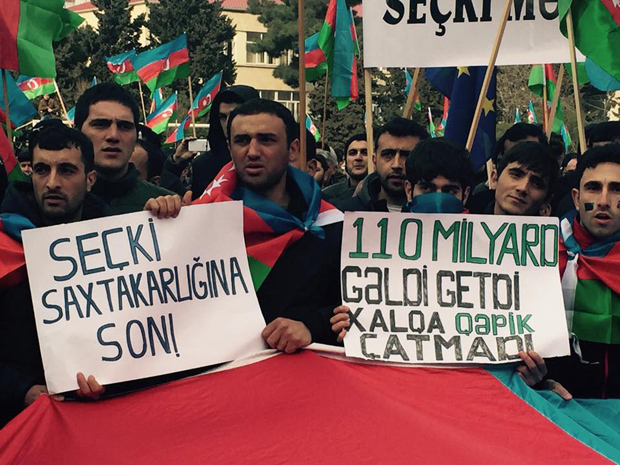
Despite the attempts to rebrand, Azerbaijan has failed to do away with accusations of human rights abuses and high-level corruption. Ranking 126/175 in the latest Transparency International Corruption Perceptions Index, a leaked US diplomatic cable once compared the country to “the feudalism found in Europe during the Middle Ages”.
In fact, some of the corruption claims have gone hand in hand with ambitious projects. Ahead of the 2012 Eurovision Song Contest, journalist Khadija Ismayilova uncovered how the Aliyev family profited from the building of the Baku concert hall where the final was to be hosted.
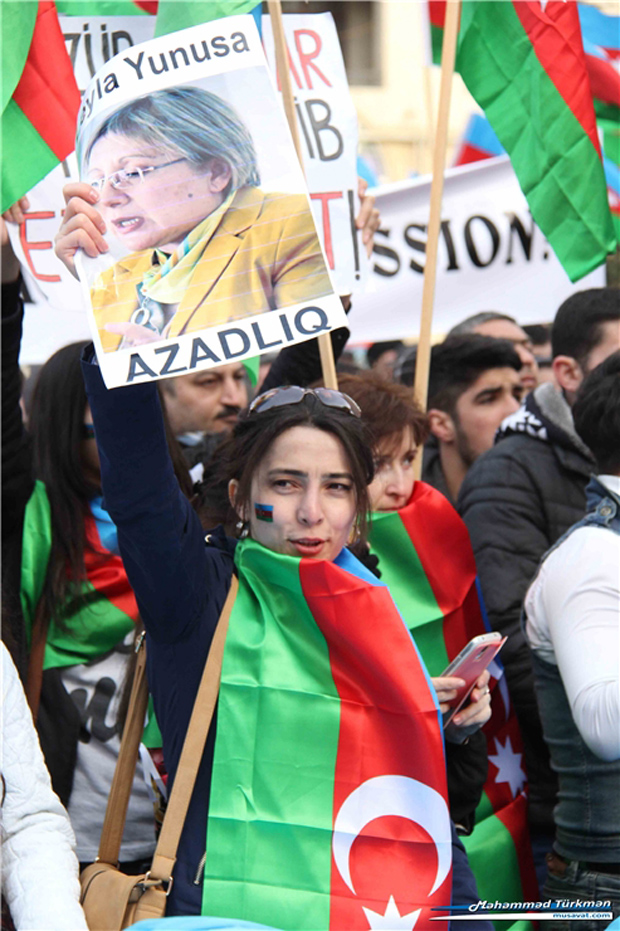
Today, Ismayilova, the country’s most famous and celebrated investigative reporter, is in jail on what is widely believed to be trumped up charges. “I have spent three and a half months in detention waiting for one prosecution, which didn’t work out. Now another one starts. Let us see if prosecutors will produce something smarter than they did so far,” she wrote in an open letter last week.
Just a few months before Ismayilova’s arrest, a number of other prominent government critics — including human rights activists Rasul Jafarov and Leyla and Arif Yunus, lawyer Intigam Aliyev, and journalist Seymour Hezi — were all detained. Though not there in person, they and the other 100 or so political prisoners in Azerbaijan, played a key part in Sunday’s protest; their faces and names adorning posters across the stadium.
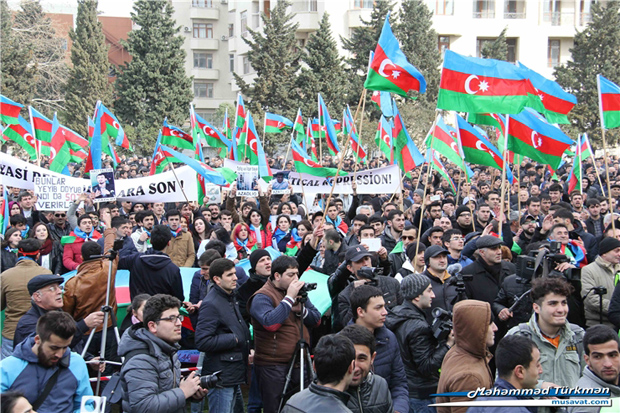
Human rights groups have warned that the European Games, like Eurovision before them, could be used to whitewash these rights abuses, and present a sanitised version of Azerbaijan to the world. With the another protest planned for 5 April, it seems government critics and regular people inside the country are determined to not let that happen.
All photos via Azadliq, reposted with permission.
This article was posted on 16 March 2015 at indexoncensorship.org
16 Mar 2015 | Magazine, mobile, Volume 44.01 Spring 2015
[vc_row][vc_column][vc_custom_heading text=”How can more refugees get their voices heard? The latest issue of Index on Censorship magazine is out now and features a special focus on the threats to free expression within refugee camps.”][vc_row_inner][vc_column_inner width=”1/2″][vc_column_text]
We follow the steps of Italian journalist Fabrizio Gatti, who spent four years undercover investigating migrant routes from Africa to Europe. We look at how social media has become a blessing and a curse – offering a connection back home and a means of surveillance. We have pieces by refugees, written from inside camps about persisting myths; by those struggling to claim rights as workers; and by those who have set up innovative, creative projects to share their stories.
[/vc_column_text][/vc_column_inner][vc_column_inner width=”1/2″][vc_empty_space height=”50px”][vc_single_image image=”64776″ img_size=”full”][/vc_column_inner][/vc_row_inner][vc_column_text]
The issue also features a thoughtful analysis of the aftermath of the Charlie Hebdo attack in Paris, with contributions from Chilean writer Ariel Dorfman; Irish co-creator of Father Ted, Arthur Mathews; Turkish novelist Elif Shafak; British playwright David Edgar; former head of BBC news Richard Sambrook; and Hong Kong-based journalist Hannah Leung. Taking the long view, this group of writers looks at the worldwide picture, and how terror is used to silence.
Also, Martha Lane Fox and retired Major General Tim Cross go head-to-head, debating if privacy is more vital than national security. We have stories about attacks on journalists covering the drug trade in South America; a cover-up of abortion figures in Nicaragua; and the lessons to be learnt from attempts to downplay epidemics, from Aids to ebola. Plus an extract from Lucien Bourjeily’s new play, which has skirted the Lebanese censors’ ban, and poetry from Turkish writers Ömer Erdem and Nilay Özer – all translated into English for the first time.
The issue’s cover artwork is by cartoonist Ben Jennings, and the magazine also features work from our regular collaborator Martin Rowson; and extracts from a graphic reportage set in an Iraqi camp, by Olivier Kugler.
[/vc_column_text][/vc_column][/vc_row][vc_row][vc_column][vc_custom_heading text=”SPECIAL REPORT: ACROSS THE WIRES” css=”.vc_custom_1483457468599{margin-right: 0px !important;margin-left: 0px !important;border-bottom-width: 1px !important;padding-top: 15px !important;padding-bottom: 15px !important;border-bottom-color: #455560 !important;border-bottom-style: solid !important;}”][vc_column_text]
How refugee stories get told
Undercover immigrant – Italian journalist Fabrizio Gatti spent four years undercover investigating refugee routes from Africa to Europe
Taking control of the camera – Almir Koldzic and Aine O’Brien on refugee camp projects – from soap operas to photography classes – that help refugees tell their own stories. Also: Valentino Achak Deng on life after fleeing Sudan’s civil war; Kate Maltby visits the Syrian Trojan Women’s acting project; and Preti Taneja on bringing Shakespeare to the children of Zaatari
The way I see it – Refugees Rana Moneim and Mohammed Maarouf share their viewpoints from inside a camp, plus a camp visitor shatters his preconceptions
Clear connections – Jason DaPonte on how social media’s power is being harnessed by refugees
Who tells the stories? – Mary Mitchell and Mohammed Al Assad on a storytelling project in a Lebanon camp
Realities of the promised land – Iara Beekma looks at life for Haitian immigrants in Brazil and their rights as workers
The whole picture – Photojournalist Chris Steele-Perkins’ honest account of decades spent capturing refugees’ stories, from Rwandans to the Rohingha
Stripsearch – Our regular cartoonist, Martin Rowson, imagines the Democratic Republic of Cyberspace
Escape from Eritrea – Ismail Einashe explores the dangers of fleeing one of the world’s harshest regimes
A very human picture – Artist Olivier Kugler illustrates life within Iraq’s Domiz refugee camp
In limbo in world’s oldest refugee camps – Tim Finch looks at the places where 10 million people can spend years, or even decades
Sound and fury – Rachael Jolley interviews musician Martyn Ware, from Heaven 17 and the Human League, on the power of soundscape storytelling
Sheltering against resentment – Natasha Joseph reports from Johannesburg on the end of the line for a sanctuary for those fleeing xenophobia
Understanding how language matters – Kao Kalia Yang recalls her childhood as a Hmong refugee in Thailand and the USA
[/vc_column_text][/vc_column][/vc_row][vc_row][vc_column][vc_custom_heading text=”IN FOCUS” css=”.vc_custom_1481731813613{margin-right: 0px !important;margin-left: 0px !important;border-bottom-width: 1px !important;padding-top: 15px !important;padding-bottom: 15px !important;border-bottom-color: #455560 !important;border-bottom-style: solid !important;}”][vc_column_text]
Outbreaks under wraps – Alan Maryon-Davis looks at how denials and cover-ups spread ebola, Sars and Aids
Trade secrets – César Muñoz Acebes investigates Paraguay’s drug war and the dangers for journalists, plus Duncan Tucker on Mexico’s courageous bloggers and social media users, who are filling the gaps where Mexico’s press fears to tread
Lies and statistics – Nina Lakhani reports from Nicaragua on the cover-up of abortion figures and domestic abuse
Charlie Hebdo: taking the long view – After the Paris murders, seven writers from around the world look at how offence and terror are used to silence, featuring Arthur Mathews, Ariel Dorfman, David Edgar, Elif Shafak, Hannah Leung, Raymond Louw, Richard Sambrook
Screened shots – Jemimah Steinfeld on the Chinese film industry’s obsession with portraying Japan’s invasion during World War II
Finland of the free – Risto Uimonen explains why the Finns always top media freedom indexes, and the Belfast Telegraph’s readers’ editor, Paul Connolly, shares his thoughts on the future of press regulation
Head to head: Is privacy more vital than national security? Martha Lane Fox and Tim Cross debate how far governments should go when balancing individual rights and safeguarding the nation
[/vc_column_text][/vc_column][/vc_row][vc_row][vc_column][vc_custom_heading text=”CULTURE” css=”.vc_custom_1481731777861{margin-right: 0px !important;margin-left: 0px !important;border-bottom-width: 1px !important;padding-top: 15px !important;padding-bottom: 15px !important;border-bottom-color: #455560 !important;border-bottom-style: solid !important;}”][vc_column_text]
The state v the poets – Kaya Genç introduces works by Turkish poets Ömer Erdem and Nilay Özer
Knife edge – Lebanese playwright Lucien Bourjeily presents an exclusive extract from his latest play as it escapes the censors’ ban
[/vc_column_text][/vc_column][/vc_row][vc_row][vc_column][vc_custom_heading text=”COLUMNS” css=”.vc_custom_1481732124093{margin-right: 0px !important;margin-left: 0px !important;border-bottom-width: 1px !important;padding-top: 15px !important;padding-bottom: 15px !important;border-bottom-color: #455560 !important;border-bottom-style: solid !important;}”][vc_column_text]
Global view – Index’s CEO Jodie Ginsberg says universities must not fear offence and controversy
Index around the world – Aimée Hamilton provides an update on Index on Censorship’s work
[/vc_column_text][/vc_column][/vc_row][vc_row][vc_column][vc_custom_heading text=”END NOTE” css=”.vc_custom_1481880278935{margin-right: 0px !important;margin-left: 0px !important;border-bottom-width: 1px !important;padding-top: 15px !important;padding-bottom: 15px !important;border-bottom-color: #455560 !important;border-bottom-style: solid !important;}”][vc_column_text]
Social disturbance – Vicky Baker looks at how user-generated content lost its innocence, from digital jihadis to hoaxes and propaganda
[/vc_column_text][/vc_column][/vc_row][vc_row][vc_column][vc_custom_heading text=”SUBSCRIBE” css=”.vc_custom_1481736449684{margin-right: 0px !important;margin-left: 0px !important;border-bottom-width: 1px !important;padding-bottom: 15px !important;border-bottom-color: #455560 !important;border-bottom-style: solid !important;}”][vc_column_text]Index on Censorship magazine was started in 1972 and remains the only global magazine dedicated to free expression. Past contributors include Samuel Beckett, Gabriel García Marquéz, Nadine Gordimer, Arthur Miller, Salman Rushdie, Margaret Atwood, and many more.[/vc_column_text][vc_row_inner][vc_column_inner width=”1/2″][vc_single_image image=”76572″ img_size=”full”][/vc_column_inner][vc_column_inner width=”1/2″][vc_column_text]In print or online. Order a print edition here or take out a digital subscription via Exact Editions.
Copies are also available at the BFI, the Serpentine Gallery, MagCulture, (London), News from Nowhere (Liverpool), Home (Manchester), Calton Books (Glasgow) and on Amazon. Each magazine sale helps Index on Censorship continue its fight for free expression worldwide.
 SUBSCRIBE NOW[/vc_column_text][/vc_column_inner][/vc_row_inner][/vc_column][/vc_row]
SUBSCRIBE NOW[/vc_column_text][/vc_column_inner][/vc_row_inner][/vc_column][/vc_row]
15 Mar 2015 | Bahrain, Campaigns, Middle East and North Africa, mobile
Index on Censorship award winner Nabeel Rajab had the final hearing on his appeal delayed for a third time, until April 15. Rajab, who is appealing his sentence over a tweet, remains under a travel ban.
“It is clear that Bahrain government can’t simply send Bahrain’s leading human rights defenders to jail while the United Nation’s human rights council in Geneva is still in session. Intimidation against him will not stop, they don’t want to end up his case as it will lead to lifting the travel ban, which is something Bahraini government very afraid of”, Sayed Alwadaei, director of advocacy for Bahrain Institute for Rights and Democracy, told Index in an email.
Index’s CEO Jodie Ginsberg said that “the continual postponements of Nabeel’s court dates is another example of how justice is not being served in Bahrain. While his case is still pending, Nabeel is not free to travel, and kept in perpetual uncertainty about his future. And all because Nabeel expressed an opinion. We call on the Bahraini authorities to drop all charges against him and for the international community to ensure that Bahrain meets its international commitments on human rights.”
In January, Rajab, the president of the Bahrain Center for Human Rights, was handed down a six-month suspended sentence pending a fine over the following tweet:
Bahrain’s ministry of interior and ministry of defence both alleged the tweet “denigrated government institutions”. Rajab was released on bail while appealing the verdict, the outcome of which was expected on March 15 before being delayed a month.
Rajab, one of Bahrain’s most prominent human rights activist, has been continuously targeted by authorities in relation to his human rights campaigning work. He was released from prison last May, where he spent two years on charges which included writing offensive tweets and participating in illegal protests.
On 12 March, Rajab wrote to Federica Mogherini, the European Union’s foreign policy chief. Calling for further international support for himself and his fellow human rights activists, he said he was “deeply disappointed by the EU’s lack of strong action to back up its human rights commitments in its foreign policy”.
He also wrote of his latest questioning by police, in early March. He says he was accused of inciting hatred towards the regime, for, among other things “accusing the police and ministry of interior with torturing detainees” and “calling the events happening in Bahrain a revolution”.
“These accusations cannot more obviously target my freedoms of expression and association,” Rajab stated. “Moreover, they are directly related to my work as a human rights activist.”
Echoing Rajab, Alwadaei believes the response from the international community could have significant impact on Rajab’s case: “I strongly believe the moment they [Bahraini authorities] feel they have less international pressure on his case he will be sent directly to prison.”
This article was posted on 13 March 2015 at indexoncensorship.org
 The 2015 Freedom of Expression Arts Award-winner is rapper Mouad “El Haqed” Belghouat, has not only seen his songs censored and his album banned but has also been imprisoned in his homeland Morocco three times since 2011.
The 2015 Freedom of Expression Arts Award-winner is rapper Mouad “El Haqed” Belghouat, has not only seen his songs censored and his album banned but has also been imprisoned in his homeland Morocco three times since 2011.








